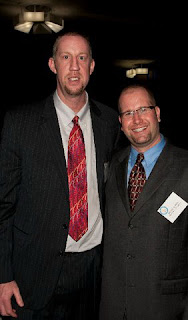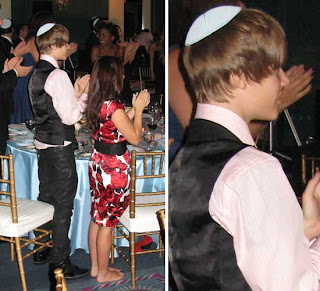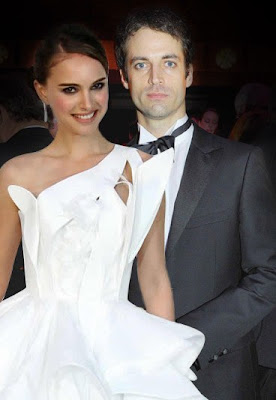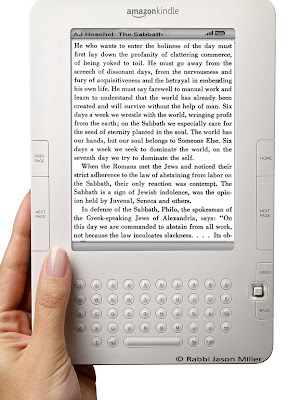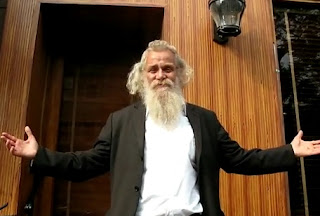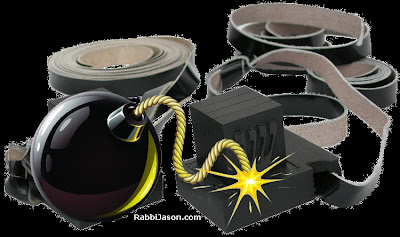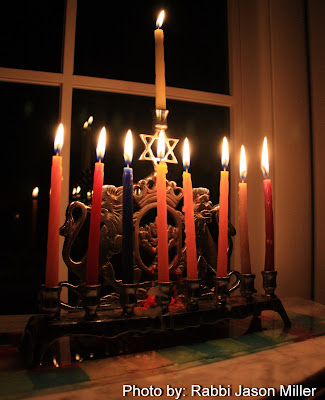Cross-posted to the Jewish Techs blog at The Jewish Week
Tech gadgets have changed our lives. And they will change our lives even more in the future.
For Sabbath observant Jews, tech gadgets pose some lingering questions about their usage on Shabbat. My teacher, Rabbi Daniel Nevins, is a member of the Committee on Jewish Law and Standards — the body that decides matters of Halakhah (Jewish law) for the Conservative movement. Rabbi Nevins has been working on a teshuvah (legal response) regarding the use of an e-book on Shabbat and was quoted on the matter in Uri Friedman’s recent article in The Atlantic, “People of the E-Book? Observant Jews Struggle With Sabbath in a Digital Age.”
I remember back in the 1990’s when CD-Roms containing entire collections of Jewish texts were first on the market. I saw a cartoon that in the first frame showed a Jewish library with hundreds of sets books — Bibles, Talmuds, rabbinic commentaries, etc. Each shelf was overfilled with Jewish books from the ancient to the modern. In the second frame, labeled modern Jewish library, was an entire library with empty shelves and one CD-Rom sitting on the shelf. At that time, the common response to the Jewish library becoming digital was that while it’s great to have the Talmud or Midrash on the computer six days of the week, on Shabbat we still want our traditional books.
Today, we’ve moved beyond having to load a CD into our computer to read Jewish books, study Torah, or look up reference material. We can now download the entire corpus of Jewish literature onto a mobile device like an e-reader. But the Shabbat issue is still relevant. Will technology trump the culture and experience of curling up with an actual book on Shabbat? As Menachem Wecker asked in his Forward article a few years ago, “Shabbat in the Age of Technology,” “Will Shabbat observance ultimately dwindle as people choose electronic entertainment over media-free rest, or will technology-addicted folks flock to Shabbat to escape their electronics-obsession of the rest of the week?”
Even for Jews who do not hold by the electricity restrictions on Shabbat (namely that electricity is in the category of lighting a fire or building), reading a book or newspaper on an e-reader seems to be the antithesis of the Shabbat experience. As the print media industry continues to move in the digital direction (US News & World Report is adopting a “digital first” strategy), there may have to be some adaption.
Uri Friedman writes in The Atlantic, “E-readers are problematic not only because they are electronic but also because some rabbis consider turning pages on the device – which causes words to dissolve and then resurface – an act of writing, also forbidden on the Sabbath.”
Friedman quotes rabbis from all over the denominational spectrum on the use of e-books on Shabbat. Rabbi Jeffrey Fox of Yeshivat Maharat, says, “There’s real value in embracing technology. It’s just about knowing when to turn it off.” And the leader of the Reform Movement, Rabbi Eric Yoffie, explained that “since the Reform movement doesn’t consider Jewish law binding, ‘The key for us [on the Sabbath] is abstaining from work that we do to earn a living and using the time to reflect and enjoy and sanctify, which is ultimately what the day is about. To the extent to which technology can contribute to that, then by all means make use of it.'”
Rabbi Danny Nevins, who reasons that the use of electricity on Shabbat is not inherently forbidden, as the circuitry connection is neither creating a fire nor building something new, nevertheless regards many types of electrical and electronic appliances as violating either the formal or informal goals of Shabbat. He says, “E-readers like the Kindle are problematic both in that they create a durable image and encourage readers to go online to shop for additional content. It is conceivable that future versions may work better with Shabbat values, but the iPad demonstrates a tendency towards multi-functionality, indicating continued challenges for Shabbat use.” In The Atlantic article, he also explains this theory that using an e-reader may violate the Shabbat laws of t’chum, or boundaries.
The Torah says you shouldn’t leave your place on the seventh day. You can say Judaism is creating a local ideal that you experience Shabbat in a place with people and don’t go out of those boundaries… The problem with virtual experiences is they distract our attention from our local environment and break all boundaries of space and time. Shabbat is about reinforcing boundaries of space and time so we can have a specific experience.
I can understand ruling that reading an e-book on a Kindle, Nook, Sony Reader, iPad, etc. is a forbidden act on Shabbat because it is not within the spirit of Shabbat. That is to say, that things not in keeping with the spirit of the Sabbath day can pull us out of that state and back to the realities of the weekday. However, I don’t agree with the rationale that it shouldn’t be allowed based on the principle that we shouldn’t leave our place on Shabbat. Any good book, whether read from traditional paper or on a tech gadget has the potential to transcend us, breaking the boundaries of space and time. Even a good story-tale that I tell my children at bedtime on a Friday night can be a virtual experience that magically takes them away from the boundaries of space and time. In fact, on Shabbat we are even supposed to be virtually transported to get a taste of the World to Come through our prayer and Torah study experiences.
There is an informal litmus test when it comes to Shabbat activity that in Hebrew is known as “ruach shel shabbat” (the spirit of Shabbat). Thus, there are certain activities that may be permitted according to Halakhah, but don’t pass the test when it comes to the spirit of Shabbat. So, it may very well be that using an e-reader on Shabbat isn’t in the category of “Shabbosdik activities” simply because it doesn’t feel like an appropriate Sabbath activity. Or, perhaps because it can lead to activities that are forbidden like accidentally ordering a new book on the device during Shabbat.
No matter how one ultimately rules about the use of an e-reader to read e-books on Shabbat, one thing is certainly clear: Technology is here to stay and we have to figure out how to “make Shabbos” in this new and emergent Digital World.
(c) Rabbi Jason Miller | http://blog.rabbijason.com | Twitter: @RabbiJason | facebook.com/rabbijasonmiller

